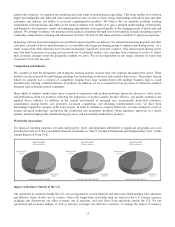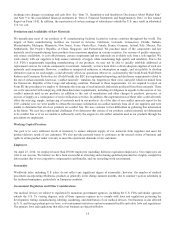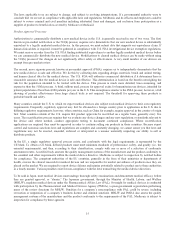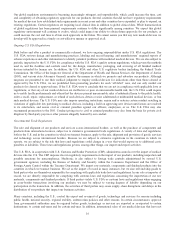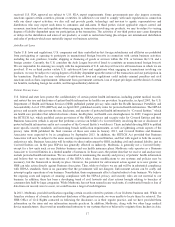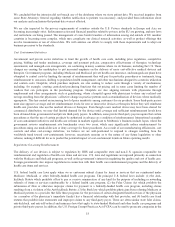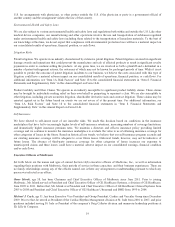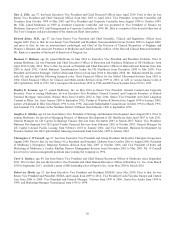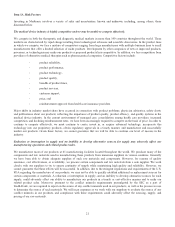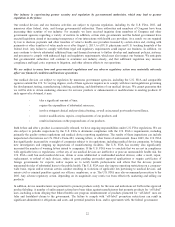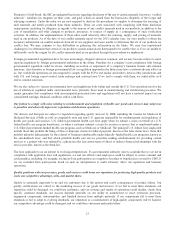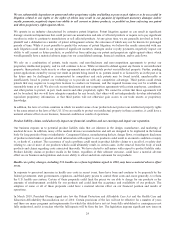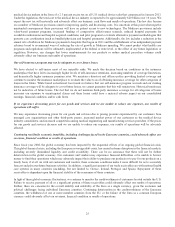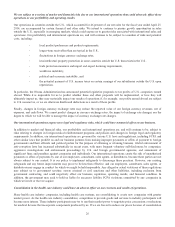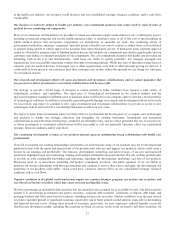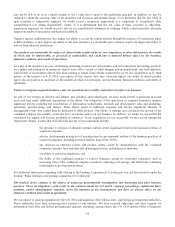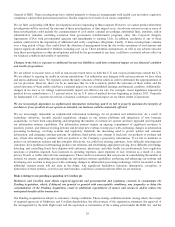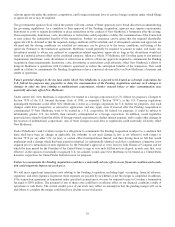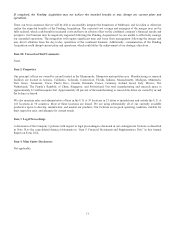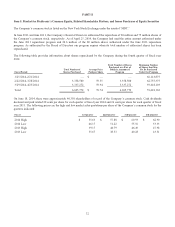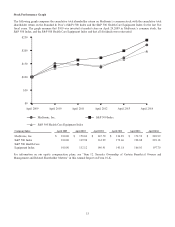Medtronic 2014 Annual Report Download - page 31
Download and view the complete annual report
Please find page 31 of the 2014 Medtronic annual report below. You can navigate through the pages in the report by either clicking on the pages listed below, or by using the keyword search tool below to find specific information within the annual report.Pursuant to Dodd-Frank, the SEC promulgated final rules regarding disclosure of the use of certain minerals, known as “conflict
minerals”: tantalum, tin, tungsten (or their ores), and gold; which are mined from the Democratic Republic of the Congo and
adjoining countries. Under the rules, we are now required to disclose the procedures we employ to determine the sourcing of
such minerals and metals produced from those minerals. There are costs associated with complying with these disclosure
requirements, including for diligence in regards to the sources of any conflict minerals used in our products, in addition to the
cost of remediation and other changes to products, processes, or sources of supply as a consequence of such verification
activities. In addition, the implementation of these rules could adversely affect the sourcing, supply, and pricing of materials
used in our products. As of the date of our conflict minerals report for the 2013 calendar year, we were unable to obtain the
necessary information on conflict minerals from all of our suppliers and were unable to determine that all of our products are
conflict free. We may continue to face difficulties in gathering this information in the future. We may face reputational
challenges if we determine that certain of our products contain minerals not determined to be conflict free or if we are unable to
sufficiently verify the origins for all conflict minerals used in our products through the procedures we implement.
Foreign governmental regulations have become increasingly stringent and more common, and we may become subject to more
rigorous regulation by foreign governmental authorities in the future. Penalties for a company’s non-compliance with foreign
governmental regulation could be severe, including revocation or suspension of a company’s business license and criminal
sanctions. Any domestic or foreign governmental law or regulation imposed in the future may have a material adverse effect on
us. Our worldwide operations are also required to comply with the FCPA and similar anti-bribery laws in other jurisdictions and
with U.S. and foreign export control, trade embargo and customs laws. If we fail to comply with them, we could suffer civil
and/or criminal sanctions.
We are also subject to various environmental laws and regulations both within and outside the U.S. Our operations involve the
use of substances regulated under environmental laws, primarily those used in manufacturing and sterilization processes. We
cannot guarantee that compliance with environmental protection laws and regulations will not have a material impact on our
consolidated earnings, financial condition, and/or cash flows.
Our failure to comply with rules relating to reimbursement and regulation of health care goods and services may subject us
to penalties and adversely impact our reputation and business operations.
Our devices and therapies are subject to regulation regarding quality and cost by HHS, including the Centers for Medicare &
Medicaid Services (CMS) as well as comparable state and non-U.S. agencies responsible for reimbursement and regulation of
health care goods and services. U.S. federal government health care laws apply when we submit a claim on behalf of a U.S.
federal health care program beneficiary, or when a customer submits a claim for an item or service that is reimbursed under a
U.S. federal government-funded health care program, such as Medicare or Medicaid. The principal U.S. federal laws implicated
include those that prohibit the filing of false or improper claims for federal payment, known as the false claims laws; those that
prohibit unlawful inducements for the referral of business reimbursable under federally-funded health care programs, known as
the anti-kickback laws; and that which prohibits health care service providers seeking reimbursement for providing certain
services to a patient who was referred by a physician who has certain types of direct or indirect financial relationships with the
service provider, known as the Stark law.
The laws applicable to us are subject to evolving interpretations. If a governmental authority were to conclude that we are not in
compliance with applicable laws and regulations, we and our officers and employees could be subject to severe criminal and
civil penalties, including, for example, exclusion from participation as a supplier of product to beneficiaries covered by CMS. If
we are excluded from participation based on such an interpretation it could adversely affect our reputation and business
operations.
Quality problems with our processes, goods, and services could harm our reputation for producing high-quality products and
erode our competitive advantage, sales, and market share.
Quality is extremely important to us and our customers due to the serious and costly consequences of product failure. Our
quality certifications are critical to the marketing success of our goods and services. If we fail to meet these standards, our
reputation could be damaged, we could lose customers, and our revenue and results of operations could decline. Aside from
specific customer standards, our success depends generally on our ability to manufacture to exact tolerances precision-
engineered components, subassemblies, and finished devices from multiple materials. If our components fail to meet these
standards or fail to adapt to evolving standards, our reputation as a manufacturer of high-quality components will be harmed,
our competitive advantage could be damaged, and we could lose customers and market share.
23


